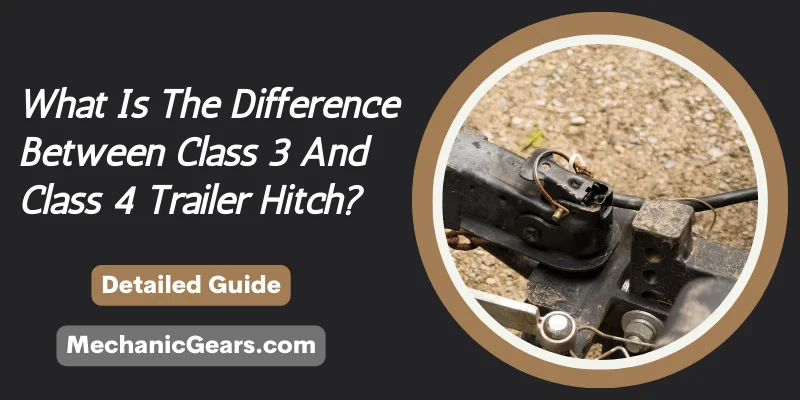Whether you need to attach a trailer to your vehicle or need to carry haul equipment easily, you cannot do it without a trailer hitch mounted to your vehicle. Imagine you are trailering a trailer that is connected to your car and you don’t know the class of the tow hitch or receiver hitch which is mounted to your vehicle, then you might end up pulling a trailer that is loaded with much heavier weight than what your vehicle can tow.

Usually, trailer hitches are mounted on the vehicle by the manufacturers so many buyers don’t usually know the trailer hitch class. It is important to know the class of the trailer hitch if you want to use the vehicle for towing load without warping your chassis. Here are all the details that will help you know what is the difference between class 3 and class 4 trailer hitch. Stay tuned for the details.
Contents
Difference Between Class 3 and Class 4 Trailer Hitch

Both class three and four of the trailer hitch are for towing heavier and large trailers as both are at the other end of the hierarchy. The trailer hitches are divided into groups on the basis of the towing weight capacity, compatible vehicles, use, and tongue weight.
As you move from class 1 to class 5 trailer hitch you will see an increase in the loading capacity. Each class has its own specific features. Scroll ahead to find out.
Class 3 Trailer Hitch
1. The class 3 trailer hitches have a lower towing weight capacity than the class 4 hitches with a range of minimum towing weight capacity of 3500 pounds GTW and a maximum towing weight capacity of 8000 pounds GTW.
2. The tongue weight of the class three trailer hitches is up to 800 pounds as these hitches cannot exert a more vertical force on the coupler or hitch ball of the trailer.
3. The class 3 hitches are found in many minivans and SUVs. You can tow mounted carrier trailers, haul cargo, landscape trailers, bike racks, and boats.
4. The class three trailer hitches have a receiving tube having two inches of dimension.
Class 4 Trailer Hitch
1. The class 4 trailer hitches are far more suitable for towing large-sized trailers like boats, RVs, coaches, and caravans and are present in heavy-duty vehicles like trucks.
2. The inside size of the receiving tube or the hitch size of two inches, so these hitches will fit ball mounts that are having a similar dimension.
3. These hitches cannot exert more vertical force than 1000 pounds TW on the coupler.
4. The class 4 trailer hitches have the Gross Trailer Weight of 10000 Pounds allowing the vehicle to have a high towing capacity as compared to the class three trailer hitches.
Final Thoughts on Class 3 vs Class 4 Trailer Hitch
Towing is not possible without a trailer hitch. The manufacturers provide a hitch that is in accordance with the vehicle’s ability. So, if you load the trailer with greater weight than what it can carry then you can damage your vehicle’s performance.
If you are looking for a hitch for large trailers then you must first know what is the difference between class 3 and class 4 trailer hitches, so you can select the suitable option for your vehicle.